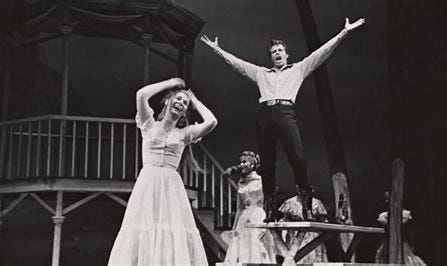The Fantasticks was well into its fourth year when its composers, Harvey Schmidt and Tom Jones (no, not that Tom Jones), got their chance on Broadway in 1963 with an adaptation of N. Richard Nash’s The Rainmaker, his 1954 play that had been filmed with Katharine Hepburn. Set in the American southwest, 110 in the Shade concerns the appearance of a Harold Hill / Elmer Gantry type of snake-oil salesman who promises to bring rain to the stricken area. He also promises to ‘bring rain to the stricken area’ of Lizzie Curry’s lonesome existence. (Those are my quote marks, not his, designed to illuminate the metaphor. It’s not innuendo).
Schmidt produced near-operatic music and Jones another set of excellent lyrics; collectively, “one of the decade’s finest” scores.1 I’ve written before about the opening, ‘Another Hot Day,’ which superbly sets the material and psychic scene. ‘Lizzie’s Comin’ Home’ is a neat, slightly acidic comment on the joy of Lizzie’s father and two brothers that she has returned from visiting relatives; yes, they are genuinely delighted, but there’s more than a hint of dependence on what she can do for them -
“She listens for hours,
Askin’ me questions.
I know the answers
When Lizzie is here”
Mordden notes that Schmidt and Jones focused on the ‘establishing songs’, distilling character and subtext into each specific number. ‘Love, Don’t Turn Away’ is relatively well-known -
“So, love, if you’re looking for a quiet place,
I’ve a heart that’s absolutely free!
Open arms that are aching
For their first embrace.
So, love, discover me?”
and Inga Swenson also got one of the great first-act closing numbers, ‘Old Maid,’ in which she sees her life endlessly roll towards the dry, dusty horizon2 -
“Growing old alone.
Lonelier with age.
Buy a tiny mockingbird
And lock him in a cage.”
not Inga Swenson, but the great Audra McDonald in the 2007 revival
Personally, my favourite number is ‘Melisande,’ the song in which Starbuck metaphorically tells Lizzie that she is a queen, is a heroine, is - in short - a woman for whom a man would perform great deeds of derring-do.
“‘My Melisande needs it!
She’s got her a dream.
She’s always wanted a golden fleece.
And I’m ready to die
For that piece of twine!’”
Starbuck’s job is to ‘make it rain,’ to release her entire femininity, not merely the nurturing side that is all well and good but, without ‘rain’, is not truly fertile. (I realise this summary appears to be saying that Starbuck’s job is to have sex with Lizzie so that she can become ‘all woman,’ like some ghastly ‘70s fantasy, but that’s our misfortune for living in the post-70s world. Rain, to quote Les Mis, will make the flowers grow; it is not merely Lizzie but the entire community who will ‘bloom’ after the Rainmaker has blown through. Rather like a John Wayne lone enforcer, however, he cannot stay in the community. He is a catalyst, too great a force for stability).
Having opened up a small play, Schmidt and Jones then kept a two-person play as a two-person musical, adapting in 1966 The Four-Poster Bed as I Do! I Do! Robert Preston and Mary Martin played a married couple from their wedding to (we might now say) downsizing after the kids leave home. It doesn’t sound entirely promising as an evening in the theatre, but Preston and Martin helped and the score, if not outstanding, is witty. Mordden grouches that “some of it is boring and some only serviceable,” but I think the defect, such as it is, is the specificity of each number, which are after all particular to that marriage at that moment. We have talked before about ‘My Cup Runneth Over,’ which is adorable, but ‘I Love My Wife’ (the morning after the wedding), ‘Flaming Agnes’ (response to husband’s remark that, after 40, ‘men go to town and women go to pot’) and ‘Where are the Snows?’ are also delightful.
“I love my wife. How will it end?
I love her as a lover and not just as a friend.
It may be abnormal, with drama it's rife.
But nevertheless I confess I love my wife.”3
And then it all went awry. Celebration (1969) lasted 110 performances - presumably in the shade - before it expired. It was “a terrible idea, but it was executed well.” The OBC recording doesn’t altogether make me wish it had succeeded and the description of the show makes it sound clunky and sophomoric, with labels rather than characters and ‘the battle of winter and summer.’ Good grief, this is a late 60s template brought to the stage, adolescent rebellion writ large. Celebration “deserves credit for originality and daring,” wrote Ken Mandelbaum, but it “was not a very interesting show and often a downright irritating one.”4
After Celebration, Jones and Schmidt never returned to Broadway. Philemon, about persecution of the early church, had some fans; Colette we know; Roadside was an adaptation of a Lynn Riggs play, which is promising if you know that Riggs’ Green Grow the Lilacs became Oklahoma! (But not that promising, as it turned out). An adaptation of Our Town went nowhere. You can find some of these on Spotify in an album called ‘Hidden Treasures 1951-2001’, if you’re really interested.
In the grand history of musical theatre, Jones and Schmidt do not merit a very long chapter. But they did achieve a very long run with The Fantasticks and nobody else can match that.
Ethan Mordden, Open a New Window
We mentioned this in the newsletter on ‘Pain in Musical Theatre.’
One of the first songs I successfully performed at AMDA, so I’m fond of it.
Not Since Carrie



